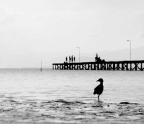Klara
 Atlantic Ocean, Pach, G. W. (Gustavus W.) (1845-1904)
Atlantic Ocean, Pach, G. W. (Gustavus W.) (1845-1904) I never know how to be fashionably late. That’s Klara’s talent.
We’d picked a place to meet that was about halfway between the two of us. It was a little closer to me, and while in the cab, I savored the small accomplishment of being the one with the shorter ride. But I was early, making it a pointless victory.
The only table available was a small one by the window, really a floor-to-ceiling glass wall. We’d decided on a Blue Bottle, as if being somewhere familiar might make us familiar to one another again, the way chain hotels and restaurants and drugstores design their entrances to all look the same so that when you walk in, you feel grounded no matter where you are or what’s outside. Klara had texted in the morning: We can pretend we’re back in San Francisco! Outside a big brick building was pressed up against another big brick building on a narrow one-way street—nothing you’d ever see on the West Coast.
I didn’t know much about New York then, there for the first time and only for two nights, staying in a $380/night Lower East Side hotel with an absurdly giant granite tub, courtesy of the media conglomerate for which I worked. I was there to report on a languishing tech giant’s new computer-tablet hybrid device if “reporting” was even the accurate way to put it. The tech company had rented a warehouse at one of the piers. They’d built giant structures inside to create a city populated with the devices—pairs going into buildings and shops; several sitting at park benches, staring at one another with their camera eyes; ones riding and driving cabs. The message, maybe, being: These little gadgets, they’re just like us. Buy a new companion today. On a giant stage in another room, product execs touted the thing’s magnesium casing and the “satisfying” clicking sound the stand made when it shut against the said casing. I had a line in my “initial hands-on” report—Sure, the magnesium is smooth, but at the end of the day, metal is metal is cold and dead—that my editor changed to FuseMg feels great in the hand. I was already tired of my job back then. When I’d first started, I thought I was on the path to doing something important and worthwhile. Now, well, I don’t delude myself.
I wasn’t in New York to see Klara, but all day, through the event’s annoying indie-pop soundtrack and the flashing colorful lights that made me worry I’d become epileptic and the long awkward pauses meant for weak applause, the thought of our forthcoming meeting would suddenly intrude my note-taking. I’d think of her, surprised and disturbed. I had convinced myself that I had moved on, gotten over whatever had happened between us, but clearly she had a stronger effect on my psyche than I was ready to admit.
It was starting to get dark. Outside of the Blue Bottle, the sidewalk traffic increased with people heading home or out to dinner, their faces shining with summer sweat. I checked my phone. I was still ten minutes early, so I walked to the counter to order the most expensive item on the menu. A Nicaraguan coffee from the siphon bar accompanied with two toffees turned out to be $15. I added a $6 goat cheese and fig scone to the order. Everything would be reimbursed through my job. I felt I had to take advantage of my extravagant daily allowance, to siphon (ha ha) as much out of the job as possible, to make up for the hollowness of the work. Back to the phone. Messages. Klara’s. I scrolled and scrolled, wanting to go back to the earliest ones I had (six years of history—I hated to delete anything that might mean something to me later), to read through them all, not for the first time, see how the tone changed over the years, when exactly we stopped contacting each other as frequently, who started it, who was more at fault. The earlier texts, full of phrases like “hahaha yes” and “heading over” and “love ya” and “do you have my…” gave way to later ones that started off with, “Hi, Klara. How are you?” or “Sorry, I didn’t see this” and ended with “Hope you are doing well.” I was trying and failing to stop thinking about our relationship in terms of blame.
It had been a year since we’d last seen each other, back in San Francisco, after another year of little contact. Klara had been back in town for a couple days,
You’re reading a preview, subscribe to read more.
Start your free 30 days





